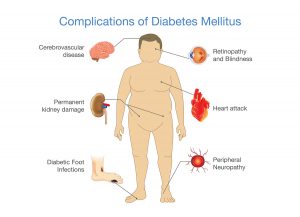The Journal of the American College of Nutrition describes a trial, which showed that CoQ-10 helps diabetics. 50 study participants had kidney damage due to diabetes (diabetic nephropathy). They received help significantly with regard to their kidney function with only 100 mg of CoQ-10 per day.
The randomized clinical trial showing that CoQ-10 helps diabetics
Here are the details about the randomized double-blind placebo-controlled clinical trial.
- There were two groups of 50 patients with diabetic nephropathy (kidney damage from diabetes). 25 patients received 100 mg of the supplement CoQ-10 daily for 12 weeks. The other 25 patients received a placebo pill daily for the same time.
- Prior to the clinical trial researchers took a metabolic profile on fasting blood samples. After the completion of the 12 week trial the patients went for the same blood tests.
- CoQ-10 reduced serum insulin levels significantly. Insulin resistance was better, as was B cell function, a measure of the immune system. The hemoglobin A1C value, where lower values indicate control of diabetes, showed significant improvement. Plasma malondialdehyde, a marker of lipid per-oxidation was also lower. In addition researchers measured AGES (advanced glycation end products) in the blood and found a significant decrease.
- There was no change in lipid profiles and fasting plasma glucose. A metalloproteinase enzyme was also part of the monitoring process , but it did not change.
Other publications regarding the benefit of CoQ-10 protecting your heart
- An important study from Japan showed how powerful coenzyme Q10 was in saving heart attack patients from dying in the first few weeks. Researchers monitored 257 consecutive cardiovascular patients who were in the the Coronary Care Unit of the Juntendo University Hospital, Japan. Patients who died had 22% lower CoQ-10 levels than those who survived. Low CoQ-10 levels showed an association with high C-reactive protein, a measure of inflammation. Patients who were on statins had 21% lower levels of CoQ-10.
- A study from 2016 followed 219 elderly patients with supplementation of 200 mg of CoQ-10 daily and selenium 200 micrograms daily for 4 years. There were two kinds of controls: 222 participants who received placebo and 227 participants receiving no treatment. The investigators found that those with the lowest selenium baseline levels had the biggest reduction of cardiovascular mortality when they received the selenium-CoQ-10 supplementation. Their cardiovascular mortality was cut by 50% over 4 years.
- Although many studies used only 100 mg or 200 mg of CoQ-10 per day, there is evidence in the literature that in the aging population higher doses of CoQ-10 per day are necessary to prevent cardiovascular disease. As I am regularly attending the A4M conferences in Las Vegas in December every year, I heard about higher CoQ-10 doses being more beneficial. As a result I have been taking 400 mg of CoQ-10 daily every year since. I am now 73 years old and my heart is healthy. But I also exercise daily for cardiopulmonary conditioning.
Conclusion
The main publication that I reviewed here deals with the power of CoQ-10 to reverse kidney damage from diabetes. I also included other evidence that CoQ-10 is an important supplement to prevent heart disease. In addition CoQ-10 helps patients who had heart attacks to survive better with CoQ-10 than without it. CoQ-10 improves the energy metabolism in the mitochondria. The heart has a lot of mitochondria in each muscle cell. Improvements in energy metabolism translate into improved cell function and make the heart pump more efficiently.
Instead of waiting until you turn sick and only then starting CoQ-10 at that time, it is much wiser to start CoQ-10 early and prevent to a large extent heart troubles. Using this thinking I have been taking CoQ-10 daily for many years.







